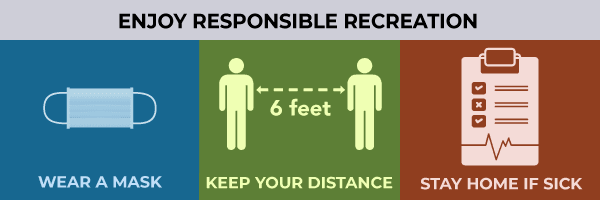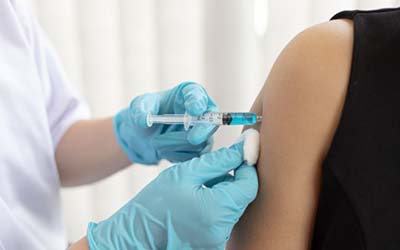| Some of this week’s stories may reflect the impact of COVID-19 and how the Michigan Department of Natural Resources has adapted to meet customers’ needs and protect public health and safety. We will continue to share news and information about the best ways to enjoy our state’s natural and cultural resources.
Follow our COVID-19 response page for FAQs and updates on access to facilities and programs. For public health guidelines and news, visit Michigan.gov/Coronavirus and CDC.gov/Coronavirus.
Here’s a look at some of this week’s stories from the Department of Natural Resources:
See other news releases, Showcasing the DNR stories, photos and other resources at Michigan.gov/DNRPressRoom.
Larger, higher-res versions of the images used below are available at the end of this email.
 Want to see more stunning pictures like this, taken by Michigan state parks photo ambassador Swapnil Patil at Proud Lake Recreation Area in Oakland County? Visit Instagram.com/MiStateParks to explore photos and learn more about the photo ambassadors! For more on the program, call Stephanie Yancer at 989-274-6182. Want to see more stunning pictures like this, taken by Michigan state parks photo ambassador Swapnil Patil at Proud Lake Recreation Area in Oakland County? Visit Instagram.com/MiStateParks to explore photos and learn more about the photo ambassadors! For more on the program, call Stephanie Yancer at 989-274-6182.
 Bird nests can be found in all kinds of places, so don’t be surprised if you find one in a hanging flowerpot, wreath or elsewhere in your backyard. Bird nests can be found in all kinds of places, so don’t be surprised if you find one in a hanging flowerpot, wreath or elsewhere in your backyard.
In addition to songbirds, mallards seem to set up spring nests just about everywhere. Female mallards, called hens, often build them in landscaping, gardens or other locations that people may find inappropriate – or at least inconvenient. If you spot one, be a good neighbor and leave the nest alone and keep pets away from it, too. The hen will lead her young to water soon after they hatch.
“Even if a duck’s nest seems quite a way from water, the hen knows how to get her ducklings to the water,” said Hannah Schauer, wildlife communications coordinator with the DNR.
Schauer also noted that a mallard will lay her eggs over several days.
“You might see eggs show up in a nest but no mother duck sitting on them. The hen will start to incubate the eggs once they all have been laid. They’ll take about a month to hatch,” said Schauer.
Canada geese sometimes build nests near houses or in parks. Adult geese are very protective and may hiss and run or fly toward perceived intruders.
“Try to avoid nesting areas, but if that is not possible, carry an umbrella and gently scare the bird away by opening and closing it,” said Schauer.
Bird nests and the eggs they may contain are protected under federal law. It is illegal to touch, move or possess any part of the nest or eggs without the proper permit.
Get additional tips and information on handling conflicts with wildlife and what to do if you find a baby animal at Michigan.gov/Wildlife.
Questions? Contact the DNR Wildlife Division at 517-284-9453. |
 Put your 2021 fishing license to good use this weekend during the trout opener and the Lower Peninsula inland walleye and northern pike seasons, which both open Saturday, April 24. Enjoy Michigan’s world-class fishing opportunities on your own or bring your family along for the fun. Put your 2021 fishing license to good use this weekend during the trout opener and the Lower Peninsula inland walleye and northern pike seasons, which both open Saturday, April 24. Enjoy Michigan’s world-class fishing opportunities on your own or bring your family along for the fun.
In Upper Peninsula waters, the walleye and northern pike possession seasons open Saturday, May 15. Michigan’s muskellunge possession season on all Great Lakes, inland waters, Lake St. Clair, and the St. Clair, St. Marys and Detroit rivers opens Saturday, June 5 (remember that catch-and-release fishing for muskellunge is open all year).
The catch-and-immediate-release season for largemouth and smallmouth bass is open all year on nearly all waters (unless otherwise closed to fishing – check the 2021 Michigan Fishing Guide for specifics). The possession season for bass opens statewide Saturday, May 29, except for Lake St. Clair and the St. Clair and Detroit rivers, which open Saturday, June 19. The Lake Erie, Detroit River, Lake St. Clair and St. Clair River daily possession limit for walleye will remain at six fish through April 30, 2022.
The new license season began April 1, so be sure you have a new fishing license. 2021 fishing licenses are valid through March 31, 2022. To purchase a fishing license, visit Michigan.gov/DNRLicenses.
The 2021 Michigan Fishing Guide and inland trout and salmon maps are available online along with other helpful fishing information; visit Michigan.gov/Fishing for the most up-to-date information. You can view the complete guide online or download it to your smart device for later use.
Questions? Contact Christian LeSage at 517-449-7073 or Sierra Medrano at 517-230-8788. |
 Black terns will return from coastal Central and South America to their breeding grounds across Michigan over the next several weeks. These graceful, robin-sized waterbirds will gather in large groups, called colonies, in the coastal and inland marshes of Michigan, where they will build their nests on floating mats or rafts of dead, crushed bulrush and cattail, and feed on insects and small fish. In its choice of surroundings, the black tern leads a double life: in North America in the summer, it is a typical bird of freshwater marshes – but come winter, it becomes a seabird along tropical coasts. Black terns will return from coastal Central and South America to their breeding grounds across Michigan over the next several weeks. These graceful, robin-sized waterbirds will gather in large groups, called colonies, in the coastal and inland marshes of Michigan, where they will build their nests on floating mats or rafts of dead, crushed bulrush and cattail, and feed on insects and small fish. In its choice of surroundings, the black tern leads a double life: in North America in the summer, it is a typical bird of freshwater marshes – but come winter, it becomes a seabird along tropical coasts.
Unfortunately, these charismatic marsh birds have declined globally since the 1960s, and up to 71% of Michigan’s black tern population has been lost. The black tern is a Michigan species of special concern and State Wildlife Action Plan focal species, and is now state-listed in all other Great Lakes states. The reason for this population loss is poorly understood, but Audubon Great Lakes and several partners are working toward understanding the underlying cause(s) and developing conservation strategies to bring these birds back.
Since 2013, Audubon Great Lakes, Detroit Audubon, the DNR, Common Coast Research and Conservation and several other partners have studied black terns at St. Clair Flats State Wildlife Area with the primary goals of estimating colony size and breeding success. St. Clair Flats is one of Michigan’s Wetland Wonders for waterfowl hunting, but it also doubles as an Audubon Important Bird Area that provides vital habitat for Michigan’s largest colony of black terns. Explore our interactive story map to learn more about this project. |
 Recent research shows that colony abandonment, likely due to invasive species, is occurring at a faster rate than the population decline, suggesting that large black tern colonies like those at St. Clair Flats have the most need for protection. Recent research shows that colony abandonment, likely due to invasive species, is occurring at a faster rate than the population decline, suggesting that large black tern colonies like those at St. Clair Flats have the most need for protection.
Want to get involved with saving these birds? Volunteer for our breeding surveys across the Lower Peninsula. You can help us understand black tern demographics, including the number of breeding pairs, newly hatched young and returning adults, as well as the location of active colonies.
This monitoring effort requires just two site visits between June 1 and July 31, and one rapid habitat assessment. Sign up today for virtual volunteer training. Data collected will help identify priority conservation areas for black terns and help guide wetlands management at key sites.
Can’t volunteer, but still want to help? Record your black tern observations on eBird and keep your eyes peeled for color-banded birds. Submit those sightings to the Bird Banding Lab.
MI Birds, a public outreach and education program created by Audubon Great Lakes and the DNR, is aimed at increasing all Michiganders’ engagement in the understanding, care and stewardship of public lands that are important for birds and local communities.
Questions? Contact Emily Osborne at 414-841-5273. |
 Submissions for 2021 patch are due April 23 Submissions for 2021 patch are due April 23
Artists, sharpen your pencils and prepare your paints! Time is almost up to submit designs for the special DNR centennial edition 2021 deer management cooperator patch.
The Michigan deer management cooperator patch, given to those who bring their harvested deer to a DNR check station, has been a popular collector’s item for hunters since the early 1970s.
This year’s patch will commemorate the DNR’s centennial, which the department is celebrating throughout 2021. Learn more at Michigan.gov/DNRCentennial.
Design submissions for the 2021 deer management cooperator patch are due April 23.
Anyone can enter the contest. Entries must be designed using the centennial template and must portray white-tailed deer or hunting white-tailed deer in a Michigan habitat. The work must be original and submitted by the artist.
Complete contest information and submission guidelines are available at Michigan.gov/Deer under cooperator patches. This year’s contest winner will be contacted in early June.
Questions? Contact Emilie O’Grady, 517-284-9453. |
 Renewable energy, green jobs, environmental justice, climate change … we hear those words and phrases more often, but what do they mean? More specifically, what do they mean to Michigan and how do these factors influence the state’s goal of carbon neutrality by 2050? Renewable energy, green jobs, environmental justice, climate change … we hear those words and phrases more often, but what do they mean? More specifically, what do they mean to Michigan and how do these factors influence the state’s goal of carbon neutrality by 2050?
Michigan’s Office of Climate and Energy recently announced two public listening sessions – April 22 (Earth Day) and May 5 – that invite residents to share their insights about climate. The Office of Climate and Energy is part of the Department of Environment, Great Lakes, and Energy. EGLE, one of the DNR’s Quality of Life sister agencies, is leading the effort to develop the MI Healthy Climate Plan, a roadmap to reducing greenhouse gas emissions statewide.
Each listening session will start with an overview of the Council on Climate Solutions and its advisory role in formulating the MI Healthy Climate Plan. The council’s input will be shaped by residents’ ideas and opinions shared during listening sessions, along with guidance from five work groups – Energy Production, Transmission, Distribution, and Storage; Buildings and Housing; Transportation and Mobility; Natural Working Lands and Forest Products; and Energy Intensive Industries.
The virtual listening sessions, using the Zoom platform, are set for:
- 10:30 a.m. Thursday, April 22.
- 6 p.m. Wednesday, May 5.
More information about submitting comments ahead of time, requesting time to speak during the sessions, getting help with accommodations for participation and accessing the Zoom meeting links is available at Michigan.gov/Climate. If you can’t attend a session but still want to be heard, share comments by email to EGLE-ClimateSolutions@Michigan.gov.
Questions? Contact Nick Assendelft, EGLE public information officer, at 517-388-3135. |
|
|
PHOTOS: Larger, high-resolution versions of some of the images used in this newsletter are available; credit Michigan Department of Natural Resources unless otherwise noted.
Black tern: Black terns are returning to their seasonal nesting grounds, but these birds need our help. Volunteer for the MIBirds breeding surveys across the Lower Peninsula or record black tern observations on eBird and keep your eyes peeled for color-banded birds.
Black tern banding: Black terns are returning to their seasonal nesting grounds, but these birds need our help. Volunteer for the MIBirds breeding surveys across the Lower Peninsula or record black tern observations on eBird and keep your eyes peeled for color-banded birds. Photo courtesy David Fuller.
Deer patch: Time is almost up to submit designs for the special DNR centennial edition 2021 deer management cooperator patch. Complete contest information and submission guidelines are available at Michigan.gov/Deer under cooperator patches.
Family fishing: Put your 2021 fishing license to good use by participating in one of the fishing seasons opening soon. Photo courtesy Recreational Boating and Fishing Foundation.
Sapling: Climate change can seriously affect our natural world, as well as influence the way we work and where and how we enjoy the outdoors. Michigan’s Office of Climate Energy is hosting public listen sessions April 22 and May 5, a great opportunity for residents to share their ideas about climate change and the state’s goal of carbon neutrality by 2050.
 Stay informed, stay safe: Mask up Michigan, DNR COVID-19 response Stay informed, stay safe: Mask up Michigan, DNR COVID-19 response
|






 Want to see more stunning pictures like this, taken by Michigan state parks photo ambassador
Want to see more stunning pictures like this, taken by Michigan state parks photo ambassador  Bird nests can be found in all kinds of places, so don’t be surprised if you find one in a hanging flowerpot, wreath or elsewhere in your backyard.
Bird nests can be found in all kinds of places, so don’t be surprised if you find one in a hanging flowerpot, wreath or elsewhere in your backyard.
 Put your 2021 fishing license to good use this weekend during the trout opener and the Lower Peninsula inland walleye and northern pike seasons, which both open Saturday, April 24. Enjoy Michigan’s world-class fishing opportunities on your own or bring your family along for the fun.
Put your 2021 fishing license to good use this weekend during the trout opener and the Lower Peninsula inland walleye and northern pike seasons, which both open Saturday, April 24. Enjoy Michigan’s world-class fishing opportunities on your own or bring your family along for the fun.
 Black terns will return from coastal Central and South America to their breeding grounds across Michigan over the next several weeks. These graceful, robin-sized waterbirds will gather in large groups, called colonies, in the coastal and inland marshes of Michigan, where they will build their nests on floating mats or rafts of dead, crushed bulrush and cattail, and feed on insects and small fish. In its choice of surroundings, the black tern leads a double life: in North America in the summer, it is a typical bird of freshwater marshes – but come winter, it becomes a seabird along tropical coasts.
Black terns will return from coastal Central and South America to their breeding grounds across Michigan over the next several weeks. These graceful, robin-sized waterbirds will gather in large groups, called colonies, in the coastal and inland marshes of Michigan, where they will build their nests on floating mats or rafts of dead, crushed bulrush and cattail, and feed on insects and small fish. In its choice of surroundings, the black tern leads a double life: in North America in the summer, it is a typical bird of freshwater marshes – but come winter, it becomes a seabird along tropical coasts.
 Recent research shows that colony abandonment, likely due to invasive species, is occurring at a faster rate than the population decline, suggesting that large black tern colonies like those at St. Clair Flats have the most need for protection.
Recent research shows that colony abandonment, likely due to invasive species, is occurring at a faster rate than the population decline, suggesting that large black tern colonies like those at St. Clair Flats have the most need for protection.
 Submissions for 2021 patch are due April 23
Submissions for 2021 patch are due April 23
 Renewable energy, green jobs, environmental justice, climate change … we hear those words and phrases more often, but what do they mean? More specifically, what do they mean to Michigan and how do these factors influence the state’s goal of carbon neutrality by 2050?
Renewable energy, green jobs, environmental justice, climate change … we hear those words and phrases more often, but what do they mean? More specifically, what do they mean to Michigan and how do these factors influence the state’s goal of carbon neutrality by 2050?









